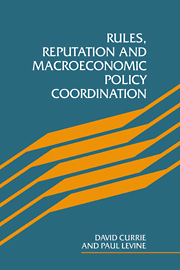Book contents
- Frontmatter
- Contents
- Acknowledgements
- Introduction
- Part I General issues
- Part II Theory and methodology
- 4 The design of feedback rules in linear stochastic rational expectations models
- 5 Credibility and time consistency in a stochastic world
- 6 Should rules be simple?
- 7 Macroeconomic policy design using large econometric rational expectations models
- Part III Fiscal and monetary policy in interdependent economies
- Bibliography
- Index
5 - Credibility and time consistency in a stochastic world
Published online by Cambridge University Press: 03 December 2009
- Frontmatter
- Contents
- Acknowledgements
- Introduction
- Part I General issues
- Part II Theory and methodology
- 4 The design of feedback rules in linear stochastic rational expectations models
- 5 Credibility and time consistency in a stochastic world
- 6 Should rules be simple?
- 7 Macroeconomic policy design using large econometric rational expectations models
- Part III Fiscal and monetary policy in interdependent economies
- Bibliography
- Index
Summary
Introduction
It is a familiar feature of optimal policies in models with forward-looking rational expectations that they are time inconsistent (see, for example, Kydland and Prescott, 1977; Calvo, 1978; Driffill, 1982). This is because, if optimal policy is formulated by Pontryagin's maximum principle, the passage of time leads to an incentive to renege on the initial optimal plan and to adopt a new one. Since the private sector can anticipate this, the initial policy lacks credibility. Appreciation of this problem has motivated the examination of policies that are optimal within the constraint of being time consistent (see, for example, Buiter, 1983; Cohen and Michel, 1988; Miller and Salmon, 1985a; Oudiz and Sachs, 1985; Levine and Currie, 1985). This analysis has been conducted in the context of developments of the standard control state space approach.
An alternative game theoretic approach to the issue has examined the possibility that reputation effects may sustain the full optimal or ideal rule. The existing literature considers this in the context of very simple model structures. Thus Barro and Gordon (1983b) show how reputation effects may move the best sustainable rule towards the ideal rule. Backus and Driffill (1985a, 1985b) demonstrate how the existence of uncertainty over the objective function of government may be sufficient to sustain the ideal rule in a simple model structure. But the generalisation of these results to models with more complicated dynamic structures is by no means straightforward.
Information
- Type
- Chapter
- Information
- Rules, Reputation and Macroeconomic Policy Coordination , pp. 122 - 147Publisher: Cambridge University PressPrint publication year: 1993
